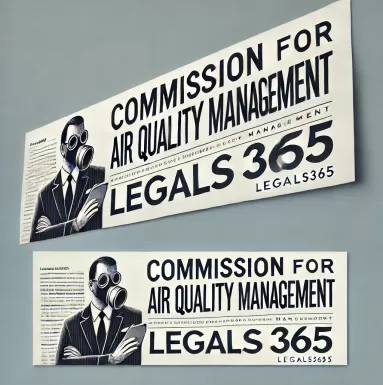
CAQM
URL copied to clipboard!
Air pollution has long been a pressing issue in India's National Capital Region (NCR), encompassing Delhi and its neighboring states. Each winter, residents brace themselves for a thick blanket of smog that engulfs the city, leading to severe health implications and diminished quality of life. In response to this escalating crisis, the Indian government established the Commission for Air Quality Management (CAQM) to devise and implement strategies aimed at mitigating air pollution in the NCR and adjoining areas.
Understanding the Commission for Air Quality Management (CAQM)
Establishment and Mandate
The CAQM was constituted in 2021 as a statutory body under the Ministry of Environment, Forest, and Climate Change. Its primary objective is to oversee and coordinate efforts to improve air quality in the NCR and surrounding regions. The commission's mandate includes formulating policies, monitoring implementation, and ensuring compliance with environmental laws to achieve cleaner air.
Composition of the Commission
The commission comprises experts from various fields, including environmental science, public health, and administration. This multidisciplinary approach ensures that diverse perspectives are considered in policy-making and implementation.
Key Functions and Responsibilities of CAQM
Policy Formulation and Implementation
One of the core functions of the CAQM is to develop comprehensive policies targeting the reduction of air pollution sources. This involves collaborating with state governments, local bodies, and other stakeholders to implement measures such as promoting cleaner technologies, enhancing public transportation, and regulating industrial emissions.
Monitoring and Enforcement
The commission is tasked with monitoring air quality levels and ensuring that entities comply with established standards. This includes conducting inspections, issuing directives, and, when necessary, imposing penalties on violators. By maintaining stringent oversight, the CAQM aims to deter non-compliance and encourage adherence to environmental norms.
Public Awareness and Engagement
Recognizing the importance of public participation, the CAQM engages in awareness campaigns to educate citizens about the health impacts of air pollution and the measures they can take to reduce their contribution to the problem. This includes promoting the use of public transportation, reducing the use of firecrackers, and encouraging waste segregation.
Challenges in Air Quality Management
Transboundary Pollution
Air pollution is not confined to administrative boundaries. Pollutants from neighboring states and countries can drift into the NCR, complicating mitigation efforts. For instance, agricultural stubble burning in Punjab and Haryana significantly contributes to Delhi's winter smog. Addressing this requires coordinated action across state lines, presenting logistical and political challenges.
Economic and Social Factors
Implementing pollution control measures often involves economic trade-offs. Industries may resist adopting cleaner technologies due to cost implications, and workers in polluting sectors may fear job losses. Balancing environmental goals with economic and social considerations is a delicate task that requires thoughtful policy design and stakeholder engagement.
Technological Limitations
Accurate monitoring and data collection are crucial for effective air quality management. However, technological limitations, such as insufficient monitoring stations and outdated equipment, can hinder these efforts. Investments in advanced technologies and infrastructure are necessary to enhance the accuracy and reliability of air quality data.
Legals365: Supporting Environmental Compliance
Navigating the complex landscape of environmental regulations can be challenging for businesses and individuals alike. This is where Legals365 steps in, offering expert legal services to ensure compliance with environmental laws and regulations.
Legal Consultation and Representation
Legals365 provides comprehensive legal consultation to businesses on matters related to environmental compliance. This includes advising on permits, licenses, and adherence to pollution control norms. In cases of legal disputes or enforcement actions, Legals365 offers representation to protect clients' interests while ensuring compliance with environmental standards.
Environmental Audits and Assessments
To proactively address potential compliance issues, Legals365 conducts environmental audits and assessments. These evaluations help identify areas where businesses may be falling short of regulatory requirements, allowing for corrective actions before penalties are imposed.
Training and Capacity Building
Understanding that knowledge is key to compliance, Legals365 organizes training programs and workshops for corporate clients. These initiatives aim to build internal capacity for environmental management, ensuring that businesses can sustainably operate within the legal framework.
The establishment of the Commission for Air Quality Management represents a significant step towards addressing the persistent air pollution challenges in India's National Capital Region. Through coordinated efforts, stringent enforcement, and public engagement, the CAQM aims to usher in an era of cleaner air and improved public health. Complementing these efforts, organizations like Legals365 play a crucial role in guiding stakeholders through the intricacies of environmental law, ensuring that compliance and sustainability go hand in hand.
#AirQualityManagement, #CAQM, #CleanAirIndia, #DelhiAirPollution, #EnvironmentalCompliance, #Legals365, #NCRAirQuality, #PollutionControl, #SustainableIndia, #EnvironmentalLaw
Legals365 offers comprehensive, expert support for all your CAQM needs. Our experienced team of legal professionals provides tailored guidance to help you navigate the complexities of CAQM cases with confidence. Whether you need assistance with documentation, court representation, or strategic planning, Legals365's CAQM services are designed to protect your interests and achieve the best outcomes. We handle every CAQM case with professionalism and dedication, ensuring that you receive personalized, client-focused support. Trust Legals365 for all your CAQM needs, as we work tirelessly to deliver results that make a difference.
Contact Us Today:
📱 Email: advocates@legals365.com
📞 Phone: +91 9625972356
Choose Legals365 for trusted, client-focused legal support in CAQM and beyond. Feel free to ask any question for free or explore answers to questions asked by live users.


